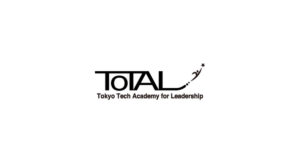・Group of Course: Recognition of Social Issues
・Course : TAL.S506 Recognition of Social Issues Workshop II
・Program: 1-day Policy Making Simulation Workshop-Promotion of industry-academia collaboration-To connect Japan’s technology to national wealth
・Facilitator: Haruka Yagi, Deputy Director of Human Resource Personnel Division, Ministry of Economy, Trade and Industry (METI)
・Date & Time: 29/Nov (Fri) 17:00-21:00
This report is on a workshop “1-day Policy Making Simulation Workshop-Promotion of industry-academia collaboration-To connect Japan’s technology to national wealth” held on 29/Nov, co-presented by both METI and ToTAL. The workshop was facilitated by Ms. Haruka Yagi, Deputy Director of Human Resource Personnel Division, Ministry of Economy, Trade and Industry (METI).
I. ToTAL/1-day Policy Making Simulation Workshop:
The Policy Making Simulation Workshop facilitated by METI marks the 8th time this year, since the original shape of the workshop was commenced in 2012 as a part of the menu of Academy for Global Leadership (AGL). From this year, this workshop is presented as a part of a course of “Recognition of Social Issues Workshop II” of ToTAL. Since this workshop is one of the ToTAL/OPEN Programs, non-ToTAL students can also apply. ToTAL understand that “leadership” is the individual capability for developing and executing new value to society, and can be considered as one of the fundamental abilities of top level students. Among such abilities, we understand that capability for understanding matters comprehensively from a higher viewpoint is one of the most important capabilities. For that purpose, we chose the topic of “policy making”, and are offering this workshop by collaboration with METI.
Through this workshop, we want students to learn the following 3 points;
1. Train to understand social issues from various viewpoints, such as future direction of society, ideal situation/system of the future and budgetary issues, as a policy to be taken by the government.
2. Understand the process of finding problems, find the essence of the problem and set issues to be solved with logical reasoning, presenting unique solution idea(s) , and construct evidences to enhance materializing possibility
3. Expand personal network in various fields
METI is also offering workshops in order to make students, including those who are considering to join METI, gain a deeper understanding of “country-level policies”. This workshop is offered as a part of such workshops and co-presented by both METI and ToTAL. As a result, hot discussion is expected among diverse students not from only Tokyo Tech but also from other universities.
II. Students:
We selected students to participate in the workshop because of oversubscription this year. As the result, 37 students, including ToTAL students, non-ToTAL students (both undergraduates and graduates) from various universities particpated in the workshop. You may find the breakdown of the participants in the figures below. Male/female ratio was 6:4. Language used in the workshop was mainly Japanese but all slides are prepared in both English and Japanese to help international students. 4 international students joined the workshop this time.
<Universities> <Graduates/Undergraduates>


<Fields of majors>

III. Workshop:
37 students were divided into 6 teams of 6-7 members. Each team consisted of members of various genders, ages, majors and universities.
1. Notice by Ms. Yagi:
Before starting discussions, Ms. Yagi gave students the following instructions:
(1) There is no “right” answer to the result of your discussion. In principal, there is no policy that is absolutely wrong. Even policies and activities which the government are engaging in now might be insufficient or wrong.
(2) The cases discussed in this workshop are actual cases that METI came across in the past. But if the time, place and conditions are different from those at that time, the conclusions might be different from those in the past too.
(3) Therefore, please consider the “best” policy as the aim of this workshop, and do not hesitate or be short-sighted, when discussing with members.


Ms. Yagi also explained the guideline for proceeding with the groupwork in each team.
Students were recommended to share the “ideal design of structure/system and fundamental set of values” among members, identify and specify “issues to be solved” by iterating consideration about the gap between “As is (present situation/system)” and “To be (structure/system to be in future)” and the needs, so that the solution idea will be enhanced by the PDCA cycle; “Plan; planning regulation, budget, and vision etc.”, “Do; executing the ideas”, “Check; evaluating the idea and hearing opinions by users” and “Act; reviewing the ideas” (Figure 1) . She also presented 3 points of policy-making as shown in Figure 2.
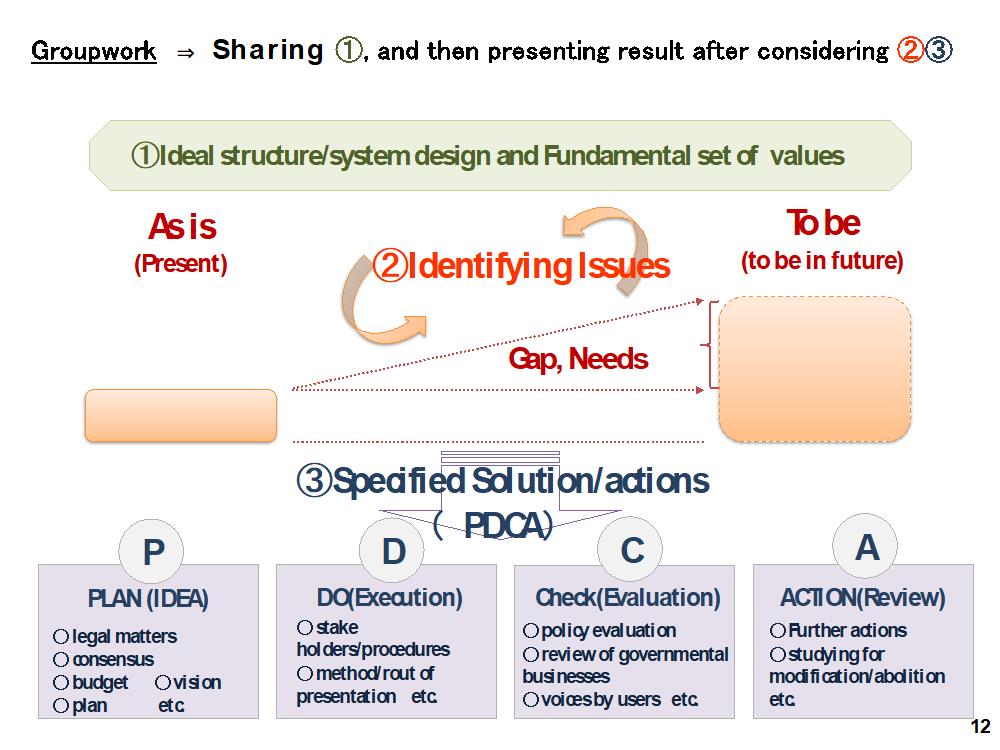
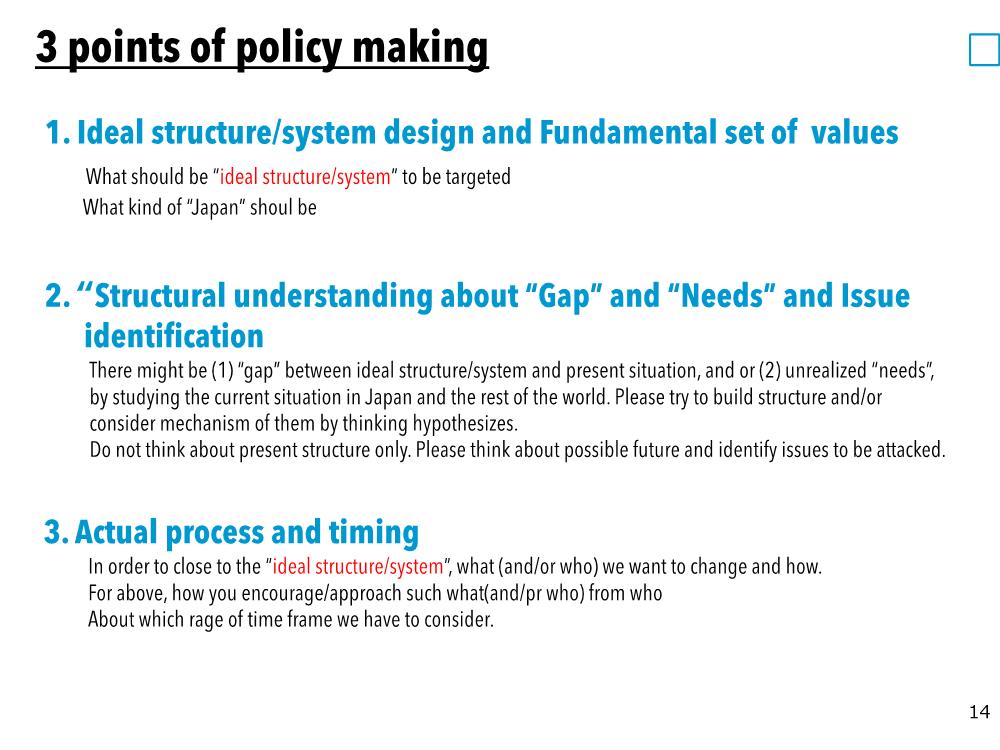
2. Theme, Mission and background information provided to students:
(1) Theme:Industry-Academia collaboration -To connect Japan’s technology to national wealth
(2) Mission:To generate a policy to “make innovations by excellent technology seeds” and/or to break the current situation where there are many excellent human resources in universities but are unable to contribute to such “innovations”
(3) Background:Ms. Yagi presented the following data and comments as background information for considering policies
i. Innovation system structure and position of universities
ii. Functions of universities
iii. Current status of budget in universities (Developing revenue sources from outside of the government)
iv. Current status of Japan – Industry-Academia collaboration centering on investment from enterprises to universities
v. Trend in the number of “university-oriented ventures” (including IPO and M&A situations)
vi. Comments by industries about having collaborations with universities
3. Discussion:
According to instructions given by Ms. Yagi as above, each team (1) shared their ideas on the ideal future structure/system, (2) clarified mechanism of the gap between future shape and current situation and the needs, and set issues to be solved, and (3) considered who, or which organization, should change and how. During the discussion, students were supposed to interview possible stakeholders to hear their comments as references, but in this workshop, Ms. Yagi and Mr. Yamashita (METI) acted as stakeholders.




4. Presentation and feedback:
Each team made a short presentation on the idea of their policy and answered various questions from other students. After presentation by 6 teams, Ms. Yagi made feedbacks to each team.




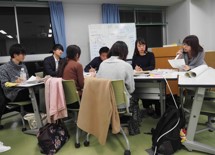
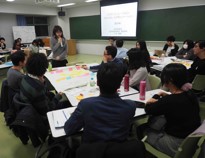
IV. Comments:
- I hope all students enjoyed the workshop which was held in a fresh environment, where students from different universities and faculties discuss on the same theme.
- I guess some students faced difficulties to understand the aim and background of the theme, set issues to be solved, and establish a policy within a limited time of 4 hours. However, it can be appreciated that each team showed a positive attitude, trying to understand the truth and core of the theme, and to present a solution which does not treat only the surface of the issues in a very proactive manner.
- On the other hand, it often happens that accomplishing the process (means) become the purpose, and I found that some students lost the original purpose of the discussion; such as discussing the roles and/or functions of universities in order to generate and execute “innovations” from technology seeds effectively and how, or discussing revenue sources (i.e. investment from industries) of universities, etc.
- In addition, I suppose students experienced difficulties when setting issues to be solved rather than finding problems. Setting issues to be solved can be accomplished after finding issues and understanding the mechanism of the future shape or needs. Same way of thinking can be found in the concept of “Design Thinking” and “Lean Launchpad”.
- We would like to express our deepest appreciation to both Ms. Yagi and Mr. Yamashita of METI, for presenting us this great opportunity.
(Prof. Keisuke Yamada, Tokyo Tech Academy for Leadership (ToTAL))

